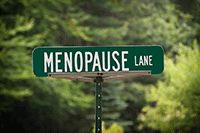
Driving with arthritis pain: Stay comfortable — and safe — behind the wheel

Daily cup of coffee may prevent afib recurrence

Gene-editing therapy lowers harmful blood fats in early study

What is EMDR therapy, and who can it help?

GLP-1 drugs versus bariatric surgery for treating obesity

Two dumbbells, three exercises, and 10 minutes

Easing the emotional burden of IBS

Modify your push-ups to meet your fitness level

What is long QT syndrome?

Stroke survivors may benefit from very low LDL levels
Menopause Makeover
 Do you suffer from hot flashes and violent mood swings? Do you have difficulty getting a good night's rest? You may be experiencing perimenopause bedlam. Some women have only mild symptoms while others are incapacitated. Biologically, menopause is defined as the absence of your period for 12 consecutive months. Perimenopause is the few years before and after menopause.
Do you suffer from hot flashes and violent mood swings? Do you have difficulty getting a good night's rest? You may be experiencing perimenopause bedlam. Some women have only mild symptoms while others are incapacitated. Biologically, menopause is defined as the absence of your period for 12 consecutive months. Perimenopause is the few years before and after menopause.
With all the talk about the dangers of taking estrogen for menopause symptoms, and the ineffectiveness of many alternative therapies, one treatment outshines all of the others to alleviate menopausal symptoms: exercise. Many of the physical changes commonly associated with menopause may actually be a reflection of inactivity or aging, and not solely a decline in estrogen production, and several studies have documented the benefit of exercise in reducing perimenopausal symptoms. Common changes that occur in perimenopause that may be combated by exercise are listed below.
Heart disease
Although younger women have a lower risk of heart disease than men, after menopause a woman's risk of heart disease is almost the same as a man's. In fact, heart disease is the major cause of death in women. Heart-disease risk may grow along with age-related increases in weight, blood pressure and cholesterol levels. A reduction in the heart-protective HDL cholesterol is common in perimenopause. Regular aerobic exercise elevates HDL and lowers triglycerides, glucose, and blood pressure, thereby reducing heart-disease risk.
Weight gain
Obesity is another promoter of heart disease. Studies suggest that the average woman gains 10 to 12 pounds in perimenopause. Regular exercise reduces the risk of weight gain. Strength training can boost muscle mass and metabolic rate so that, even at rest, a woman will burn more calories.
Depression
Regular physical activity can help to relieve mild to moderate depression as well as improve self-esteem. Exercise unwinds the menopause springs of tension that may take the form of depression, anxiety or hot flashes. During exercise, hormones flood your body, causing you to relax, and the depression-fighting neurotransmitters in the brain surge.
Hot flashes
Hot flashes are often considered the flagship signal of perimenopause. Hot flashes are often accompanied by rapid heart rate and heavy sweating that disrupts sleep. Studies have shown that women who exercise have fewer hot flashes than sedentary women. The reduction in symptoms may be related to the release of endorphins during exercise. Relaxed, slow abdominal breathing can also reduce severity and frequency of hot flashes.
Osteoporosis
The dramatic drop in estrogen at menopause accelerates bone loss. Weight-bearing activities such as jogging and strength training can help to increase bone density.
Vagina and bladder problems
As estrogen levels decline, the genital area gets drier and thinner and the vaginal muscles become weaker. Many women experience painful intercourse, thereby making sex less appealing. Others have urinary incontinence. Exercising pelvic muscles through Kegel exercises strengthens the vaginal muscles and improves bladder control, resulting in less leakage.
Other Tips:
- Continue to use birth control until you have had one full year without a period.
- Eat a balanced diet high in fruits, vegetables and whole grains but low in saturated fat. Eat three or more calcium-rich foods along with at least 800 IUs, or international units, of vitamin D each day.
- Get a good night's sleep. Interrupted sleep contributes to depression and irritability. Some strategies for reducing nighttime wakefulness include using bed for sleep and sex only, avoiding heavy meals in the evening, limiting alcohol intake, and not napping in the daytime.
- Feeling scattered and forgetful may be tied to sleep disturbances, stress, and inactivity, rather than to estrogen decline. On the other hand, good health habits such as regular exercise and stress reduction have been linked to improved memory.
- If you suffer from hot flashes, avoid hot-flash triggers such as spicy foods, caffeine and alcohol. Also, try dressing in layers and sleeping in a cool room.
Are you feeling overwhelmed by menopause? Try a balanced lifestyle approach to menopause to bring calm to the chaos.
Disclaimer:
As a service to our readers, Harvard Health Publishing provides access to our library of archived content. Please note the date of last review or update on all articles.
No content on this site, regardless of date, should ever be used as a substitute for direct medical advice from your doctor or other qualified clinician.

Driving with arthritis pain: Stay comfortable — and safe — behind the wheel

Daily cup of coffee may prevent afib recurrence

Gene-editing therapy lowers harmful blood fats in early study

What is EMDR therapy, and who can it help?

GLP-1 drugs versus bariatric surgery for treating obesity

Two dumbbells, three exercises, and 10 minutes

Easing the emotional burden of IBS

Modify your push-ups to meet your fitness level

What is long QT syndrome?

Stroke survivors may benefit from very low LDL levels
Free Healthbeat Signup
Get the latest in health news delivered to your inbox!
Sign Up




